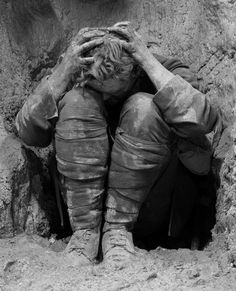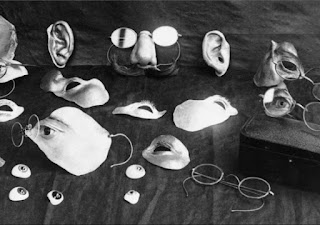A sample of today's writing from Shell Shock. To set the scene, Doug Slattery is in search of a missing soldier, and visits George Laderoutte in hopes of getting information:
At first it appeared that Doug was alone in the room. The
sunlight lit the better part of the room, but made the areas untouched by it
seem darker still by comparison. There was a chair on either side of a coach
which faced the fireplace, which contained a fire, and in the chair that faced
away from Doug, he could see a head above the chair’s backing.
Doug walked towards the coach before turning around and
facing the figure in the chair. Fearing the worst, Doug was relieved to find
the man in the chair did not appear too damaged, at least not noticeably so.
There was a certain unevenness to his facial features, a certain tilt to the
head that was somewhat disconcerting. His shoulders were covered by a blanket,
so that Doug was unsure of what damage might have been hidden underneath.
“George Laderoutte?” Doug asked. Getting no response, he
continued. “My name is Doug Slattery. Thank you for meeting with me,” he said,
and reached out his hand to shake with the other. But no hand came from the
blanket, the unbalanced stare not really telling Doug if the man had even heard
or understood him.
Doug sat himself on the edge of the couch closest to the
other, trying his best to appear comfortable and genuine. There was something
about the appearance of the other that made Doug look away. He found his gaze
instead focusing on the mantel above the fireplace, where family pictures were
displayed. He saw one that must have been George, only slightly younger and
lacking the glasses he now wore. Doug turned his gaze back to the man sitting
in front of him, the shadows he was sitting in more pronounced due to the bright
fire beside him. Still, the unexplained unevenness of his appearance made
Doug’s gaze unable to maintain eye contact for long. He shifted his stare back
and forth between the man and the picture of who he had been.
“I’d heard you were in the same battalion as Peter Rothary,”
Doug talked, filling the silence the other was unwilling to break. “As you
know, his is missing. Anything you could tell us of him would be much
appreciated.”
“Peter,” said the other, the voice coming as if through a
filter. While his face appeared undamaged, as he spoke the normal facial
movements were lacking. He spoke from lips that barely parted, the words
somehow formed from somewhere deeper inside him
“Yes?”
“You wish to know what happened to Peter,” his voice
sounding as though it were coming through a telephone. “There is only one way
to know what happened to Peter, what happened to me. What happened to all of
us.”
“And what might that be?” asked Doug quietly.
“To know what happened to Peter you must see through Peter’s
eyes, experience what he and I and a generation of young men have experienced.
You must live in the trenches, you must know war before you can hope to know
what happens to the soldier.”
Doug remained quiet for a while, wondering about the best
way to approach his next question. But George continued.
“You…you are not much older than I am. Why were you not sent
to the trenches?”
“I am an American,” Doug began, knowing that wasn’t an
answer. The U.S too, was now at war. But the other did not bother to question
his response.
“I do not judge you.” He was perhaps younger than Doug and
yet he spoke to him as if an old man to his grandson. “You are better off not
knowing. You are better not looking too closely at the truth. You have your
health, you have your illusions. Live the life humans are meant to live. Do not
go searching for madness, for that is all you will find, madness and death.”
“I am only looking for the truth.”
“Madness and death are the truth,” he said, the words coming
out of him as from a dusty tomb. “All else is a façade. We paint over the
unpleasantness, it is only natural. Man is not meant to live with the truth,
any more than any other animal. We are meant to go through the motions, perform
all the duties encoded in our genes. But there are abysses that are never
intended for human sight. And when those such as myself are forced to gaze into
it, we are not permitted to speak of it.”
“And yet I ask you to. Whatever affect it might have on me
is not your responsibility but my own.”
George shifted in his seat, a hand that had been hidden by
the blanket now gathered it about him. “My position in the war for a time was
as a censor, you know. It was my duty to scan all the correspondence written by
the soldiers to their family, to make sure the truth did not make it back to
people such as you, who could not have accepted it.”
Doug did not wish to deny the truth George had been forced
to see, yet he could not accept the answers he had come to. “Perhaps the truth
would have helped put an end to the war.”
“That is what I thought. I couldn’t live with myself
anymore, could not live with the idea that I was keeping the truth covered. And
so I gave up my position behind the lines and was sent instead to the front
lines to fight.
“But I was wrong,” he continued. “The fragile façade was all
that mattered, and it has been irreparably shattered. We see now what we are,
killers unable to control the machines we have created. We were too smart to be
content, and yet not smart enough to grasp what it was we sought.”
“So you say. I do not deny what you have seen, what you have
experienced. And yet your perspective is altered by it the way any other
person’s perspective is limited by their experience.”
“If you had such courage you would have been to the front
and seen for yourself. Then you might have the right to question me, but you
would not. No one I have ever talked to has come back unchanged.”
Doug had until that time avoided staring too directly at the
other. There had been something about him that assaulted his sensibilities. And
Doug wished to respect what George had been through. But he made sure now to
stare him in the eye, as if to directly confront the dark vision that was truth
to him. Doug had not lived through the war, but he had peered deeply into the
darkness that was inside of humanity and had survived and perhaps even become
stronger because of it. He would not accept the other’s answer, would not look
away merely because he feared the answers.
“I do not willingly look into the darkness,” said Doug. “I
look for the light, it is only natural to do so. But the light I search for now
is somewhere amidst the darkness. You may deny that any such light can exist,
but it is my choice to believe otherwise. Will you not help me in finding what
it is I seek?”
George unwrapped the blanket from his shoulders and arose
from his chair. Doug had been concerned that he had been wounded in the war,
was pleased to see he still had his limbs and the use of them. He walked to the
mantel place, his back towards Doug. He picked up the picture of himself that
sat there, stared at it for a moment as if trying to remind of himself of who
it was he once had been. Then he removed his glasses, set them on the mantel,
and turned back towards Doug and the sunlight.
Doug did not immediately look at George, looking instead at
the glasses sitting on the mantel. It was far more than the glasses that sat on
the mantel, and at last Doug understood. They sat in front of the picture of
the younger man who wore no glasses. When George had removed his glasses he
removed with it a nose, an eye, and part of his cheek. Doug looked now at the
man in front of him and saw something he could not understand. How could such
damage be done to someone and still permit him to speak? Doug could not put the
pieces of the puzzle together, could not see how such a thing could have been created
from the remains of what once had been a human face. How could the war have
taken it apart in such a fashion? What blueprint were the doctors who operated
on him working from when they attempted to reassemble it?
Doug stared without regard or awareness, unable to make
sense of what it was he saw. Where before he could not seem to stare directly
at the former soldier, now he could not look away.
“You wish to look at the truth. Then let us put aside the
lies that try to make the truth more appealing.” The voice still sounded as
though it came from elsewhere, but Doug now understood why. How he was able to
speak at all was not something Doug could understand. He could not perceive of
anything that seemed to be a mouth. “Where is your light in the darkness? What
do you see in me that speaks of some deeper truth that is worth scratching
beneath the surface?”
“I’m sorry,” said Doug, finally able to avert his gaze.
“It is nothing. It is but the surface, and yet you would
wish to look beneath. You would explore the darkness, but you will find
nothing.”
“I do not do so lightly. I have questions that need
answering. The evil that manifests itself on the battlefields does not end
there.”
“I will tell you what I know, but it will do you no good.
Sooner or later you will turn your eyes from the truth. I have seen it so
often, from men far braver than you, men who were willing to go to war and face
their fears. When the war became too great, they looked away, refused to see
any further. Something inside them flickered out so that they would not have to
deal with the truth.”
“I'll take my chances,” said Doug. “Do you know where Peter
Rothary is?”
“He is among those whose mind could no longer endure the
light, who live instead in the darkness.”
“What does that mean?”
“He has found himself a bunker inside of himself which
provides safety. He has discovered a shelter from reality. The world calls it
madness, but they know nothing of it. The doctors who try to heal men up only
to return them to war are the mad ones.”

































